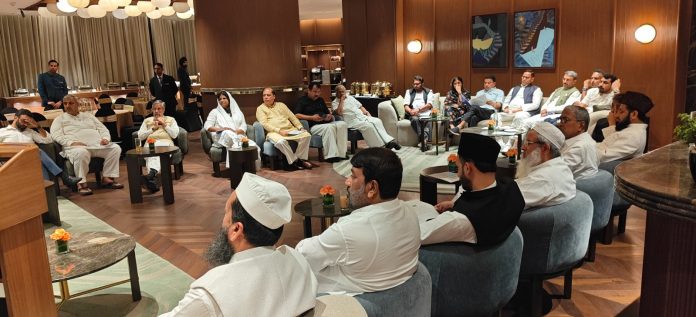– Abdul Bari Masoud
In an unusual display of cross-party unity, Members of Parliament from various political parties came together at a high-profile gathering in the national capital to express serious concerns about rising hate speech, the marginalization of minorities, and India’s changing stance on the Palestine issue.
The event, hosted by Jamiat Ulama-i-Hind (Mahmood Madani faction) at a five-star hotel, brought together parliamentarians from the Congress, Samajwadi Party, Trinamool Congress, DMK, Biju Janata Dal, Indian Union Muslim League (IUML), and others. A detailed report presented by Jamiat Ulama-i-Hind during the meeting highlighted alarming developments: state-backed targeting of Bengali-speaking Muslims in Assam, increasing communal rhetoric, attacks on secularism, and India’s growing diplomatic alignment with Israel.
In his keynote speech, Maulana Mahmood Madani, president of Jamiat Ulama-i-Hind, strongly criticized the Modi government’s silence on the humanitarian catastrophe in Gaza. “Today, humanity is bleeding in Palestine. Remaining silent is a blot on our conscience,” he said, urging India to reclaim its moral high ground by standing with the oppressed.
Madani also raised serious concerns about the situation in Assam, accusing state authorities of using eviction drives to displace Bengali-speaking Muslims under the pretext of legality. He proposed the formation of an all-party parliamentary delegation to visit Assam and independently assess the situation if official clearance was denied. The suggestion was widely endorsed by attending MPs.
IUML MP E.T. Mohammed Basheer backed Madani’s proposal and advocated the inclusion of civil society voices. “The Constitution is under attack. All secular forces must come together,” he said.
Samajwadi Party MP Shivpal Singh Patel emphasized that the targeting was not limited to Muslims, noting that other marginalized communities were also under threat. His colleague Harendra Malik criticized the government’s ideological drift towards M.S. Golwalkar’s vision, which he warned excluded minorities from the national framework.
TMC MP Nadeem Haque condemned what he called a “nationwide witch-hunt” against Bengali-speaking Muslims, while IUML’s Abdusamad Samadani praised Jamiat’s consistent advocacy for the marginalized.
Maulana Muhibullah Nadvi drew a haunting comparison between the conditions in Assam and the ongoing situation in Gaza. “Families are being picked up without warrants, held in makeshift detention camps, and subjected to violence,” he said.
Congress MP Mohammad Jawed urged that the proposed Assam visit should not be limited to Muslim lawmakers. “Dalits and OBCs too are victims of this divisive politics. This resistance must be inclusive,” he stressed.
Other MPs voiced further concerns:
Isa Khan Choudhury (Congress, West Bengal) questioned the legality of linguistic profiling in Assam.
Mujeebullah Khan (Rajya Sabha, Odisha) referenced a disturbing case of communal violence in Odisha, where a Muslim girl was set on fire.
Mian Altaf Larvi (National Conference) warned that India’s global image was being damaged.
Mohammed Hamdullah Sayeed (Lakshadweep) noted Arabic had been removed from school syllabi and madrasas were under threat.
Haris Beeran (Rajya Sabha) called for urgent legal remedies and a stronger judiciary role in curbing injustice.
The Jamiat report received strong endorsement from several MPs including Imran Pratapgarhi, Imran Masood (Saharanpur), Iqra Hasan Chaudhary (Kairana), Abu Tahir Khan, Agha Syed Ruhullah Mehdi, Mohammad Abdullah (DMK), Abdul Wahab, J.B. Mathur, and G. Kumar Naik.
Senior Jamiat leaders such as General Secretary Maulana Hakeemuddin Qasmi and Maulana Shabbir Ahmad Nadvi also addressed the gathering, emphasizing the need for a united front to resist the rise of communalism and defend constitutional values.
The evening concluded with a powerful call for all secular, democratic, and justice-loving forces in India to come together to uphold the spirit of the Constitution and safeguard the rights of all citizens.




